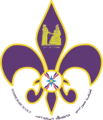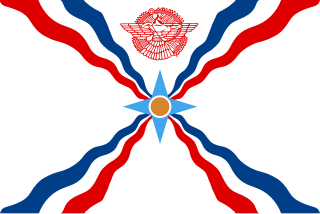
Assyrians are an indigenous ethnic group native to Assyria in West Asia. Modern Assyrians descend from their ancient counterparts, originating of the ancient indigenous Mesopotamians of Akkad and Sumer, who first developed the civilisation in northern Mesopotamia that would become Assyria in 2600 BCE. Assyrians have been speaking dialects of Suret, a Semitic language of the Neo-Aramaic branch, since approximately 1000 BCE. Some Modern Assyrians may culturally self-identify as Syriacs, Chaldeans, or Arameans for religious, geographic and tribal identification.
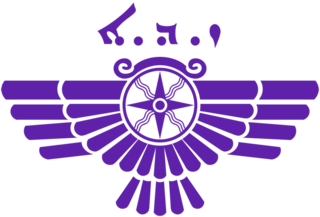
The Assyrian Democratic Movement, popularly known as Zowaa, is an Assyrian political party situated in Iraq, and one of the main Assyrian parties within the Iraqi parliament. The Assyrian Democratic Movement states its aims are to establish equal citizenship rights with the rest of the Iraqi people without discrimination on the basis of nationality, belief, religious affiliation, culture, language and other characteristics of the native Chaldo-Assyrian Syriac people of Iraq, to acknowledge the past massacres committed against them and to ensure they are never repeated again.
Scouting and Guiding in Mainland China was reported as banned with the establishment of the People's Republic of China (PRC) by the Communist Party since 1949. Instead, the Young Pioneers of China and the Communist Youth League, led by the Communist Party, have become the dominant youth organization in mainland China for younger and older youth, respectively. However, China now has multiple and originally separate Scouting activities within its borders. In 2004, the Scout Club of Hainan (海南童子军俱乐部), borrowing heavily from Scouting in terms of emblems, uniforms and activities, was founded in Hainan Province; it is, however, not affiliated with worldwide Scouting. An attempt to organize a nationwide Scouting organization in Wuhan was ended by the government in 2004. The Scout Association of the People's Republic of China (中华人民共和国童军总会), founded in 2008 serves Venture Scouts in both genders as well as Rover Scouts. The Rover Explorer Service Association operate groups in China.

The Bharat Scouts and Guides (BSG) is the national Scouting and Guiding association of India. The national headquarters of BSG is recognised by the Government of India.
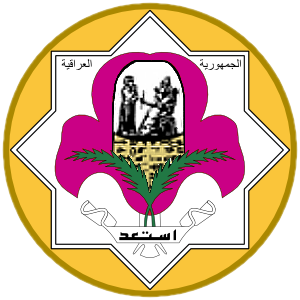
Iraq was one of the first Arab nations to embrace the Scouting movement, launching its program in 1921, just two years after the League of Nations had created the country out of the old Ottoman Empire. Iraq was a member of the World Organization of the Scout Movement from 1922 to 1940, and again from 1956 to 1999 before being reintroduced as a member again in 2017.

The Assyrian diaspora refers to ethnic Assyrians living in communities outside their ancestral homeland. The Eastern Aramaic-speaking Assyrians claim descent from the ancient Assyrians and are one of the few ancient Semitic ethnicities in the Near East who resisted Arabization, Turkification, Persianization and Islamization during and after the Muslim conquest of Iraq, Iran, Syria and Turkey.
Iraqi Assyrians are an ethnic and linguistic minority group, indigenous to Upper Mesopotamia. Assyrians in Iraq are those Assyrians still residing in the country of Iraq, and those in the Assyrian diaspora who are of Iraqi-Assyrian heritage. They share a common history and ethnic identity, rooted in shared linguistic, cultural and religious traditions, with Assyrians in Iran, Assyrians in Turkey and Assyrians in Syria, as well as with the Assyrian diaspora. Assyrian diaspora in Detroit, Chicago and Sydney are predominantly Iraqi Assyrians.
The Scout and Guide movement in Iraq is served by

The Assyrian homeland, Assyria refers to the homeland of the Assyrian people within which Assyrian civilisation developed, located in their indigenous Upper Mesopotamia. The territory that forms the Assyrian homeland is, similarly to the rest of Mesopotamia, currently divided between present-day Iraq, Turkey, Iran and Syria. In Iran, the Urmia Plain forms a thin margin of the ancestral Assyrian homeland in the north-west, and the only section of the Assyrian homeland beyond the Mesopotamian region. The majority of Assyrians in Iran currently reside in the capital city, Tehran.

Iraq, officially the Republic of Iraq, is a country in Western Asia. It is bordered by Turkey to the north, Iran to the east, the Persian Gulf and Kuwait to the southeast, Saudi Arabia to the south, Jordan to the southwest and Syria to the west. The capital and largest city is Baghdad. Iraq is home to diverse ethnic groups including Iraqi Arabs, Kurds, Turkmens, Assyrians, Armenians, Yazidis, Mandaeans, Persians and Shabakis with similarly diverse geography and wildlife. The vast majority of the country's 44 million residents are Muslims – the notable other faiths are Christianity, Yazidism, Mandaeism, Yarsanism and Zoroastrianism. The official languages of Iraq are Arabic and Kurdish; others also recognised in specific regions are Neo-Aramaic, Turkish and Armenian.
Assyrians/Syriacs in Sweden are citizens and residents of Sweden who are of Assyrian/Syriac descent. There are approximately 150,000 Assyrians/Syriacs in Sweden.
The Scout and Guide movement in Australia consists of:
Youra Eshaya Pera (1933-1992) is a former Iraqi and ethnic Assyrian football player who was the first Iraqi player ever to play in Europe.

Chaldean Catholics, also known as Chaldeans, Chaldo-Assyrians or Assyro-Chaldeans, are modern Assyrian adherents of the Chaldean Catholic Church, which originates from the historic Church of the East.

Assyrians in Lebanon are people of Assyrian descent living in Lebanon. It is estimated that there are approximately 30,000 Assyrians currently residing in Lebanon, primarily in Beirut and Zahlé. This number includes the descendants of Assyrian genocide survivors who fled Iraq, Turkey, and Iran between 1915-1934.

Terms for Syriac Christians are endonymic (native) and exonymic (foreign) terms, that are used as designations for Syriac Christians, as adherents of Syriac Christianity. In its widest scope, Syriac Christianity encompass all Christian denominations that follow East Syriac Rite or West Syriac Rite, and thus use Classical Syriac as their main liturgical language. Traditional divisions among Syriac Christians along denominational lines are reflected in the use of various theological and ecclesiological designations, both historical and modern. Specific terms such as: Jacobites, Saint Thomas Syrian Christians, Maronites, Melkites, Nasranis, and Nestorians have been used in reference to distinctive groups and branches of Eastern Christianity, including those of Syriac liturgical and linguistic traditions. Some of those terms are polysemic, and their uses have been a subject of terminological disputes between different communities, and also among scholars.

Assyrian nationalism is a movement of the Assyrian people that advocates for independence or autonomy within the regions they inhabit in northern Iraq, northeastern Syria, northwestern Iran, and southeastern Turkey.
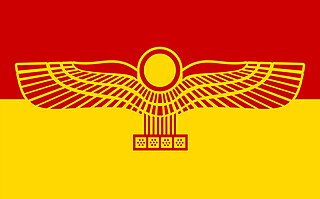
Aramean Democratic Organization also known as ArDO, was founded in 1988 and is an Aramean political party in Lebanon. The Aramean Democratic Organization's goal is to reestablish Aramean independence and reconstituting the Aramean-Syriac Nation by reclaiming the heartland of the ancient ancestral homeland most of which lies within today's Syria and Lebanon.
Assyrian folk/pop music, also known as Assyrian folk-pop or modern Syriac music, is the musical style of the Assyrian people derived from traditional music that includes a broad range of stylistic varieties, which would also encompass fusions of Western genres such as pop, electronic, Latin, jazz and/or classical music, with a melodic basis of Assyrian folk.
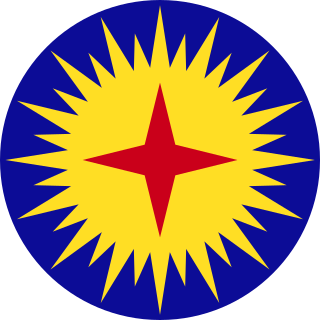
Dawronoye is a secular, leftist, national liberation movement among the Assyrian people. Ideologically characterized by progressive ideas and including socialist elements, its founding roots can be traced to the late 1980s in the town of Midyat in Turkey. The modern manifestation of the movement is controversial among Assyrian organizations worldwide, particularly due to its ties to the Kurdistan Workers' Party (PKK) and the Democratic Union Party (PYD).

